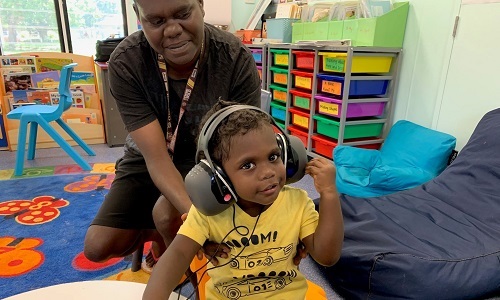Researchers at the National Acoustic Laboratories work closely with Aboriginal and Torres Strait Islander communities to find better care solutions for children with hearing problems.
Ear disease and hearing loss are more common and severe among Aboriginal and Torres Strait Islander children compared to non-Indigenous children.
National Acoustic Laboratories (aka NAL) has a special research program dedicated to supporting the hearing health of Indigenous children, families, and communities.
NAL collaborates with Aboriginal and Torres Strait Islander community stakeholders and experts to find ways to intervene earlier and provide the best treatment for children.
This research is vital in addressing the specific challenges faced by Indigenous communities in terms of hearing health. NAL’s work is guided by its Aboriginal and Torres Strait Islander Research Leadership Group, which helps identify the most important areas to focus on. They work together with communities and services to address shared priorities in the Roadmap for Hearing Health.
Aboriginal caregivers’ perspectives on supporting young children’s hearing health and language development.
Caregivers, such as parents and other family members, play a crucial role in identifying ear infections and hearing problems early, seeking treatment, and supporting their children’s development.
To ensure that intervention and support services meet the needs of children and families, it is important to understand the perspectives of caregivers. The NAL conducted a study, led by Wiradjuri researcher Michelle Kennedy to learn how caregivers support their children’s hearing health and language development.
The study used a method called Yarning, which involves informal conversations that follow cultural protocols, to gather insights from Aboriginal caregivers in both urban areas of NSW and remote communities in the NT.
By understanding caregivers’ experiences and gathering their suggestions for improvements, service providers and healthcare professionals can assess how well they are meeting the needs of Aboriginal children and their families. This knowledge can empower and support caregivers in their important role. The findings of the study also contribute to NAL’s research efforts to improve ear health and hearing support for Aboriginal and Torres Strait Islander children and families. Ultimately, the goal is to prevent the long-term negative impacts of hearing loss caused by ear infections like otitis media.
Learn more about NAL by reading its Annual Impact Report 2022.

